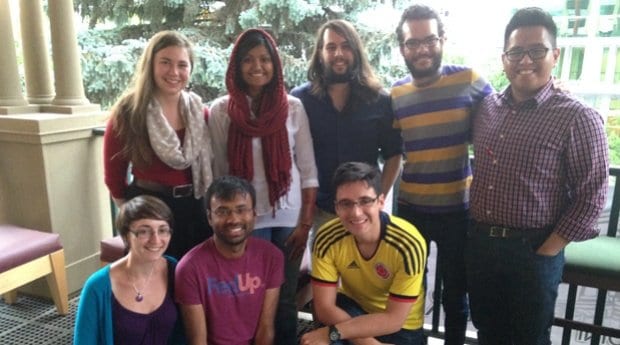As Calgary gears up for its annual Pride festivities this week, Calgary Outlink is planning celebrations to mark 30 years as a home for the city’s queer community.
Over three decades, Outlink has served the community through a period of immense change, both for LGBT people and the city. Queer people have gone from being a vilified minority to being virtually legal and social equals, while Calgary has grown up from a sleepy Prairie city to a sprawling metropolis of almost 1.2 million people. Through it all, Outlink has stayed relevant to the queer community by maintaining a social service model above everything.
The group was formed in 1984 after an earlier group, the Gay Information Resource Centre, disbanded. The new organization, Gaylines, provided a phone counselling and resource service aimed primarily at gay men. It eventually merged with a similar phone line, Lesbian Link, to create the Gay and Lesbian Community Services Organization, which eventually became Outlink.
Today, Outlink focuses on providing support services and counselling to Calgary’s LGBT community and diversity education for private institutions. It offers one-on-one peer counselling, as well as support groups for men, women, youth, trans people and their families, and recent immigrants and refugees. It hosts regular social events, recently reopened its LGBT Community Library, and is sponsoring a project to catalogue Calgary’s queer history.
For gay historian and former volunteer Kevin Allen, Outlink served an important role for Calgary’s small gay community when it started.
“The social-work aspect was a bit more dire than it is today. When I was on the phone lines in the ’90s, we’d have a fair number of suicide prevention calls,” he says.
And in the pre-internet world, Outlink was the main place to find information about the queer community.
“[Callers] wanted to know where the bars were or the bathhouse or the gay-friendly doctor. There was no internet, so Outlink was a critical organization,” he says.
But although the organization wasn’t explicitly political, it did aid in the fight for gay rights. Gay people weren’t protected under Alberta’s human rights legislation until a Supreme Court decision in 1998.
“Outlink was also home for Calgary Lesbian Gay Political Action Guild. That was our main human rights agitator locally. When gay and lesbian rights weren’t protected by provincial human rights legislation, they would work on behalf of people who were fired, evicted or intimidated,” Allen says. “I think there’s been struggle in Outlink in the past to maybe speak up when there’s large injustice. We have to be careful as a charity what kind of lobbying we can do. So we’ve worked in harmony with other organizations to achieve our political ambitions.”
For Brett Mason, the current executive director of Outlink, the change in Calgary has been dramatic, but there’s still work to be done.
“In the ’90s, if you were gay and you were just walking down the street in the downtown areas, there’d be gangs of young straight men who would be just going around in their pickup trucks with baseball bats looking for gay men to beat up. Now that doesn’t happen,” he says. “We have legal equality, but we still don’t have cultural equality. So when we look at things like homophobic violence, health inequality, poverty and all of those other factors, we still see LGBT community vastly overrepresented. We’re here to address that.”
Outlinks is hosting Pride & Patio: A Pride Day/Parade Route Brunch
Sat Aug 31, 10:30am
Thomsons Restaurant patio at the Hyatt Regency, 700 Centre St St E
calgaryoutlink.ca


 Why you can trust Xtra
Why you can trust Xtra


